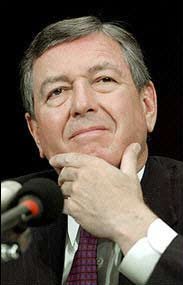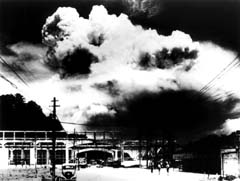Humanitarian intervention
Lieutenant General Charles Bouchard, Commander of NATO’s Military Operations in Libya, would like you to know that NATO is fulfilling its U.N. mandate to stop and prevent attacks against civilians with precision and care.
Protecting Libyan civilians apparently includes taking the time to fire two missile into a family home and executing babies for having the wrong grandfather. But not taking the time to stop and rescue 72 Libyan refugees — people fleeing the war that NATO is practicing with so much precision and care
— from dying of hunger and thirst while adrift at sea.
After several hours of waiting, it became apparent to those on board that help was not on the way. The vessel had only 20 litres of fuel left, but the captain told passengers that Lampedusa was close enough for him to make it there unaided. It was a fatal mistake. By 27 March, the boat had lost its way, run out of fuel and was drifting with the currents.
“We’d finished the oil, we’d finished the food and water, we’d finished everything,” said Kurke, a 24-year-old migrant who was fleeing ethnic conflict in his homeland, the Oromia region of Ethiopia. “We were drifting in the sea, and the weather was very dangerous.” At some point on 29 or 30 March the boat was carried near to an aircraft carrier – so close that it would have been impossible to be missed. According to survivors, two jets took off from the ship and flew low over the boat while the migrants stood on deck holding the two starving babies aloft. But from that point on, no help was forthcoming. Unable to manoeuvre any closer to the aircraft carrier, the migrants’ boat drifted away. Shorn of supplies, fuel or means of contacting the outside world, they began succumbing one by one to thirst and starvation.
The Guardian has made extensive inquiries to ascertain the identity of the aircraft carrier, and has concluded that it is likely to have been the French ship Charles de Gaulle, which was operating in the Mediterranean on those dates.
French naval authorities initially denied the carrier was in the region at that time. After being shown news reports which indicated this was untrue, a spokesperson declined to comment.
— Jack Shenker, Aircraft carrier left us to die, say migrants, in The Guardian (8 May 2011)
I’m sure that they had something very important to do that day.
For most of the migrants, the failure of the ship to mount any rescue attempt proved fatal. Over the next 10 days, almost everyone on board died.
We saved one bottle of water from the helicopter for the two babies, and kept feeding them even after their parents had passed,said Kurke, who survived by drinking his own urine and eating two tubes of toothpaste.But after two days, the babies passed too, because they were so small.On 10 April, the boat washed up on a beach near the Libyan town of Zlitan near Misrata. Of the 72 migrants who had embarked at Tripoli, only 11 were still alive, and one of those died almost immediately on reaching land. Another survivor died shortly afterwards in prison, after Gaddafi’s forces arrested the migrants and detained them for four days.
— Jack Shenker, Aircraft carrier left us to die, say migrants, in The Guardian (8 May 2011)
Lieutenant General Charles Bouchard, Commander of NATO’s Military Operations in Libya, would like you to know that NATO regrets all loss of life, especially the innocent civilians being harmed as a result of this ongoing conflict.
A Spokesman for NATO would like you to know that Saving lives is a priority for any Nato ships.
Progressive Peace President Barack Obama would like you to know that his Kinetic Military Action in Libya was necessary to avert a humanitarian catastrophe.







